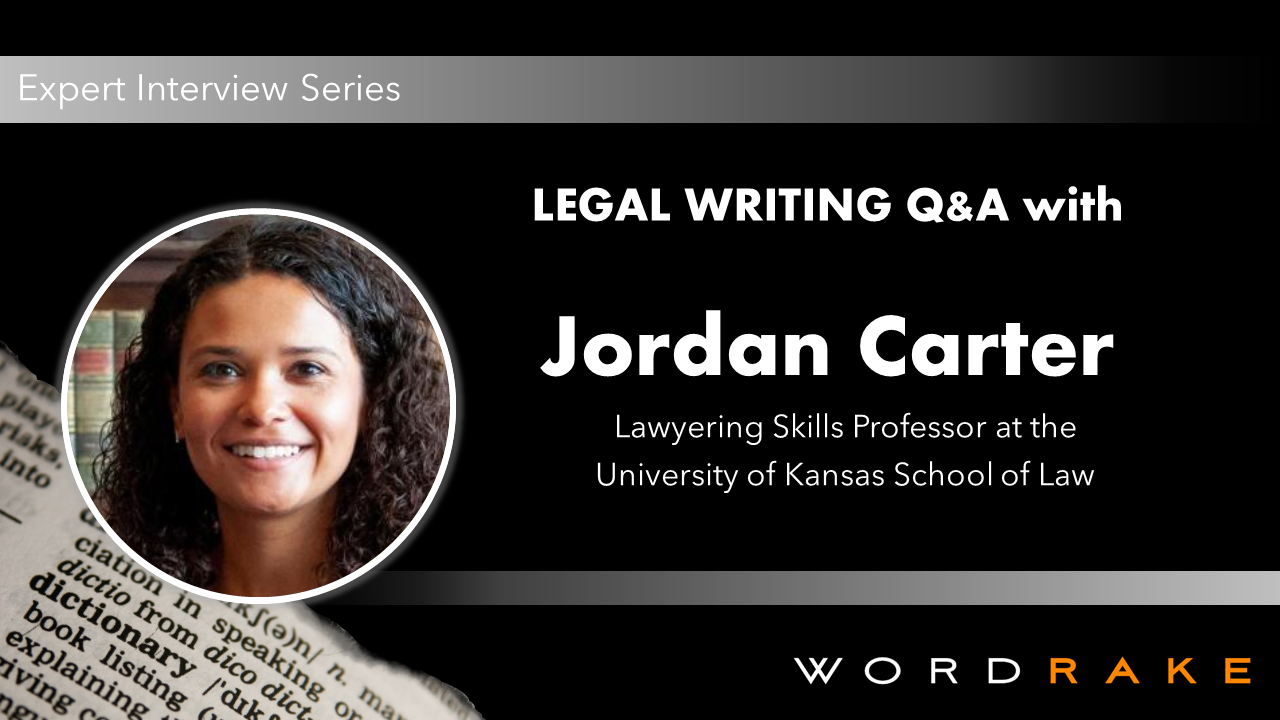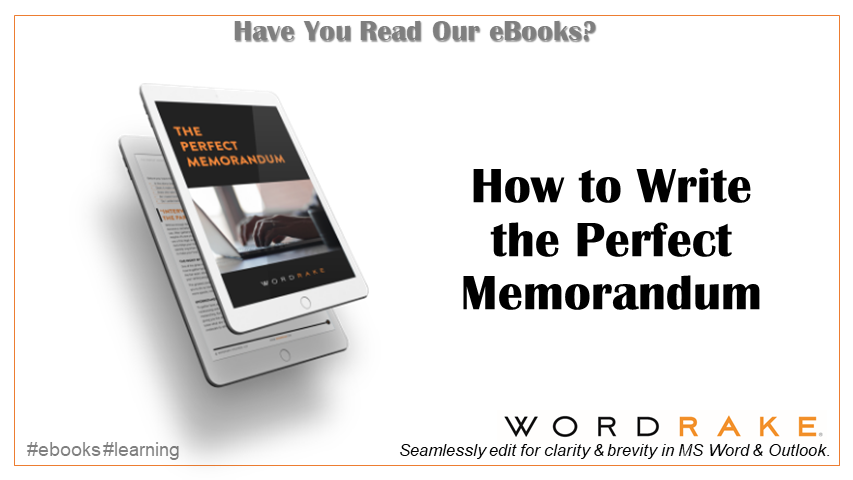Sometimes professors give advice that feels theoretical rather than practical. They sometimes have romantic ideas about their craft and give poetic rather than concrete feedback. Jordan Carter is not that professor. Jordan has practiced law, clerked for a judge, and now teachers young lawyers how to write, and she shares her experience and realistic perspective on the process of learning to write legal documents.
What is your role and how did you get to where you are today?
I teach Legal Research & Writing, which we call Lawyering Skills, at the University of Kansas School of Law. I am a Kansan who went to KU for law school. After graduating, I worked at a large Kansas City law firm doing product liability litigation. It was a wonderful first lawyer job where I learned an incredible amount—and I also learned big law wasn’t for me in the long term. For two years afterwards, I clerked for a magistrate judge in Kansas City, which was a chance to practice research and writing all day every day. In 2021, right after I found out I was pregnant, I got the opportunity to return to KU to teach. I just finished my third year of teaching, and I am happily in the groove in Lawrence, where I live with my husband, two dogs, and daughter, who is now two-and-a-half.
What is the most frustrating part about becoming a good legal writer? How do you overcome it?
The most frustrating part is unlearning the way of writing most of us have spent decades practicing. As a former Women & Gender Studies major in undergrad, I empathize—we write long papers with flowery language and the goal is to stretch out what we’re saying. We love semicolons and adjectives. We feel confident that if there’s one thing we can do before law school, it’s write. Then we get to law school, only to be told, “Nope! That’s not how we do it!” You have to set those ingrained preferences down and begin again. It is a new language.
The only way to learn it is to do it—over and over again, badly at first. It requires humility, persistence, and a growth mindset. It is a skill, like any other, and you get better at it when you try it, analyze it, reflect on it, and try it again.
We often say that writing is about communicating information to the reader, or even translating it, rather than just delivering information. Do you believe that’s true? How does it change your approach to legal writing?
It’s one thing to understand a concept. It’s another to be able to teach it. As writers, we are teachers, teaching to a potentially vast audience. The sign of mastery is being able to communicate complex thoughts simply. Could a high schooler understand what you’re saying? That’s the aim. And that is way harder than being able to recite the law.
We know this when we read an opinion that is full of archaic legalese. It could be intellectually astounding and have the strongest legal arguments you can imagine. And yet, if the reader cannot easily digest it, the writing hasn’t accomplished its goal. Our job is for the reader to do as little work as possible, not for us to feel self-congratulatory that we can use big words.
Why is it so hard to edit your own writing? Why is it important to do so?
We feel ownership over the words we labored over. We are attached because it’s our words and we are biased toward them. Eventually we accept we have to kill our darlings. No first draft is good, unless you’re Taylor Swift writing voice memos. The rest of us have to plod through a mediocre (or worse) first draft, then add, add, add, then cut, cut, cut. In my opinion, the magic is in the editing. That’s why it’s essential to give yourself enough time to come back with fresh eyes. The leap between “this paper is in pretty good shape” and “this is a final draft I’ve revised twice more” is gigantic.
How can legal writers improve their ability to accept and incorporate editing feedback?
Depersonalizing the process is huge. We work on teams. Many of us will be junior to other lawyers with strong writing preferences, some of which are different from our own. Once you accept much of legal writing is preference, the process becomes more approachable. Part of being a junior legal writer is accepting those preferences the vast majority of the time. That’s part of the reality of a professional environment. It can be annoying, but it’s not worth battling or taking it personally. I always capitalized “plaintiff” until I clerked. My judge made it lowercase on the first order I sent him, and that was that. Now I keep it lowercase. It’s fine.
What advice would you give to legal professionals who are just starting out in the legal world?
Don’t reinvent the wheel. If you work in a place with a document management system, look at how other people do it. Start from there. That is not cheating. It’s why your office invested in the system – for efficiency and to standardize the process. Similarly, ask to be copied on emails so you can see how people communicate. Who is copied on emails? How are people addressed? How do people include attachments? How formal are people? There is a learning curve in a new environment. You can glean a lot about the conventions from just watching and copying how other successful people do it. There will be time to riff and advance later on.
Where do you look outside of law for advice or guidance about writing? How do you determine what advice will apply or translate well?
The internet is good for this. People who write on X/Twitter/whatever it’s called know how to do this. There are amazing storytellers on Instagram stories (I’m a Millennial so that’s where I live, but I hear TikTok is good for this, too). You have to be concise and often pithy. You’re connecting with a broad audience, but you need a specific point of view. You have to get your point across succinctly because we all have limited attention spans. Social media is undoubtedly a dumpster fire, but the medium forces a focus on production values. We could use more of that in legal writing.
What are your top 3 tips for helping legal professionals better plan their writing to meet deadlines?
I’m obsessed with time management. First, I believe in time-blocking. I physically block out time on my calendar for every project both in my work life and personal life. If it lives in my head, I may or may not get around to it. If it lives on my calendar, it’s real.
I set incremental deadlines. That memo that’s due in two months might as well not exist. But working backwards, I know I need a decent draft a week ahead (time for editing!). I know I need a bad draft a week before that. I know I need an outline a week before that. I know I need to start researching before that. Working backwards, I can break up projects in chunks to make it doable.
My third tip is to double the amount of time you think you need for every step. Just double it straight out of the gate. It’s more accurate.
About Jordan Carter
Jordan Carter teaches Lawyering Skills at the University of Kansas School of Law. She is a member of the Professional Identity Formation Committee and Diversity, Equity, Inclusion, & Belonging Committee. Prior to joining the KU Law faculty, Carter was a judicial law clerk for Hon. James O'Hara at the United States District Court, District of Kansas and a product liability associate with Shook, Hardy & Bacon LLP in Kansas City, Missouri. In her spare time, Jordan enjoys reading, pop culture, and exploring Lawrence with her toddler daughter, Charlie.
About the Legal Writing Interview Series
WordRake founder Gary Kinder created the software to help legal writers edit for brevity and simplicity. In continued dedication to the most effective legal writing, this Series highlights the experience and advice of experts from professors to writing coaches to litigators. Looking to help boost your legal writing skills? Get a free 1-week trial of WordRake here.








